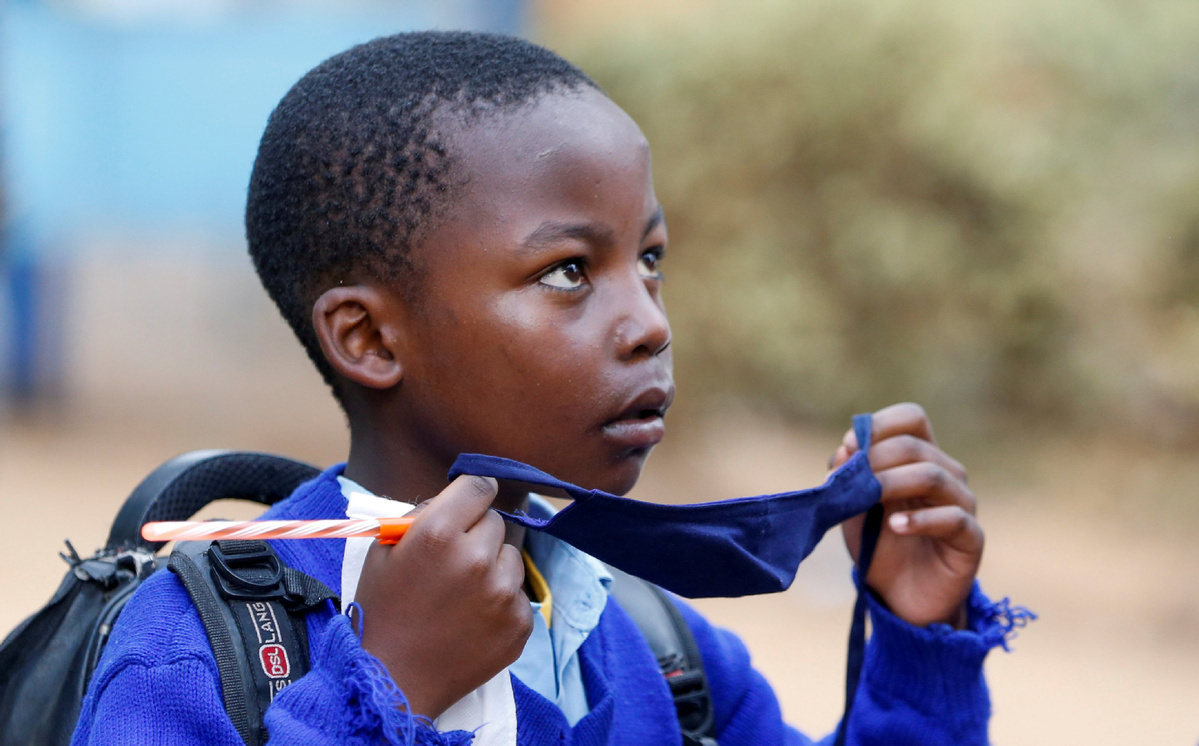
A schoolboy wears a face mask as he arrives at the Olympic Primary School during the partial reopening of schools in Kibera slums of Nairobi on Oct 12, 2020. (Photo: Agencies)
With the ongoing concerns Africa may be left behind in accessing the coronavirus vaccine in a timely fashion, the African Centers for Disease Control and Prevention has assured the continent it's doing its best to ensure Africa gets vaccines in 2021 and in large quantity.
In his virtual weekly briefing on Thursday, Dr John Nkengasong, the director of Africa CDC, said in addition to the Covax facility assurance to provide enough doses for an initial 20 percent of the African population, the AU is committed to immunizing 60 percent of the continent's population.
Toward that end, he said the AU is actively engaging two funding sources, namely African Import Export Bank and the World Bank.
Additionally, the African Vaccine Acquisition Task Team has been active in looking for supplementary doses of vaccine. So far, the team is in discussion with several manufacturers to ensure the continent acquires enough doses.
"What we have seen so far is the early versions of vaccines and I'm sure by the end of the month and mid-January, other vaccines will have gone through phase 3 clinical trials and the menu of vaccines will continue being improved," Nkengasong said.
He said vaccine timelines will be dictated by the ability for the Covax mechanism to start delivering them to the continent, and measures of Africa's readiness like having the required storage facilities.
To enhance the continent's vaccination readiness, Nkengasong said the Africa CDC in partnership with the World Health Organization will be rolling out guidelines on how to deliver vaccines to countries.
An average of 79 percent African adults are willing to take coronavirus vaccine if it is deemed safe and effective, according to a survey conducted by the Africa CDC in partnership with the London School of Hygiene and Tropical Medicine.
Launched on Thursday and carried out across 15 African countries, the survey identified knowledge gaps, cultural beliefs, and attitudes to inform interventions for pre-deployment of vaccines across the continent.
Respondents who are older, who know someone who has tested positive for coronavirus and those who live in rural areas are more inclined to take a coronavirus vaccine than younger people, those who have not seen the virus affect anyone and those living in urban areas.
Scientists attributed rejection of a coronavirus vaccine to misinformation and disinformation, as most of those who said they would not take it believed the disease is man-made, does not exist, or is exaggerated and does not pose a serious threat.
Others think they are not at risk of being infected with the virus, while some others believe that natural remedies and alternative medicines are safer than vaccines.
Additionally, individuals who have had a positive coronavirus test and have recovered believe they do not need a vaccine because they think they have become immune to the disease and can no longer be infected.
Professor Heidi Larson, the study co-lead and director of the Vaccine Confidence Project at the London School of Hygiene and Tropical Medicine, said the findings highlight the critical need for strategic engagement at the community level to address long-term disapproval of vaccines and hesitancy to take it among some segments of the population.
She said the findings highlight the need for constructive education and awareness to provide information will allow individuals to make an informed decision to accept a vaccine.
"Engaging with communities and being responsive to their concerns and information needs around the coronavirus vaccine will be crucial to building trust, not only around COVID-19 vaccine, but for vaccines in general," she said.
Respondents generally mentioned WHO, healthcare professionals, governments, pharmaceutical companies, Gavi and Africa CDC as the trusted sources for approval in terms of safety and efficacy of a coronavirus vaccine.


